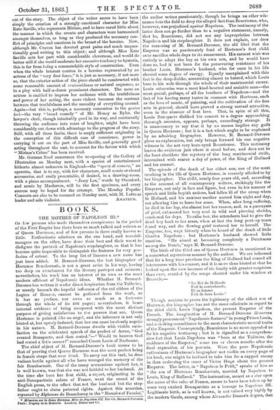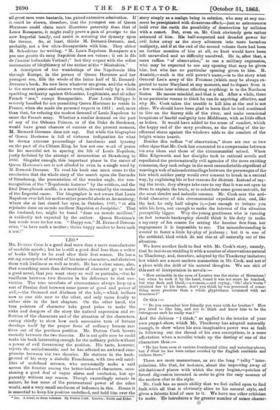BOOKS.
THE MOTHER OF NAPOLEON III.* OF few persons who made themselves conspicuous in the period of the First Empire has there been so much talked and written as of Queen Hortense, and of few persons is there really known so little. Enthusiastic admirers on the one hand, and scandal- mongers on the other, have done their best and their worst to disfigure the portrait of Napoleon's stepdaughter, so that it has become quite impossible to distinguish the features for very pro- fusion of colour. To the long list of limners a new name has just been added. M. Bernard-Derosne, the last biographer of Hortense Beauharnais, is not a great artist in his way, having too deep an attachment for the literary pastepot and scissors ; nevertheless, his work has an interest of its own as the most modern offshoot of Napoleonic ideas. Whether M. Bernard- Derosne has written it under direct inspiration from the Tuileries, or merely beneath the hopeful influence of the red ribbon of the Legion of Honour, cannot be gathered from the work, as it has no preface, nor even so much as a foot-note through the whole of its 466 pages; nevertheless, it bears internal evidence of being composed with the most distinct purpose of giving satisfaction to the powers that are. Queen Hortense is painted like an angel, and the inference is not only hinted at, but openly deduced, that her son must be clearly angelic in his nature. M. Bernard-Derosne dwells with visible satis- faction on the celebrated speech of the prefect of Arras, "God created Bonaparte, and then rested."—" Would to heaven God had rested a little sooner!" remarked Count Louis of Narbonne.
The chief object of M. Bernard-Derosne's book seems to be that of proving that Queen Hortense was the most perfect being in female shape that ever lived. To carry out this task, he does valiant battle against all who have wronged the memory of the fair Beauharnais. One of the many accusations against her, it is well known, was that she was not faithful to her husband. At the time she bore her first child, a report, originating in the anti-Bonapartistic salons of France, went the round of the English press, to the effect that not the husband but the step- father ought to claim paternal rights. Against this assertion, repeated by Alphonse de Beauchamp in the " Memoirs of Fouche,"
• Mhnoires seer la Reale Hortense, Mire de Napoleon M. Par CI. Bernard-Derosne. Paris: Dupray dela MAWS'. London:: Dulau and Co.
the author writes passionately, though he brings no other wit- nesses into the field to deny the alleged fact than Bourrienne, who, however, was prejudiced against Napoleon. The testimony of the latter does not go further than to a negative statement, namely, that he, Bounienne, did not see any improprieties between Napoleon and his stepdaughter. It does not explain, nor does the reasoning of M. Bernard-Derosne, the old libel that the Emperor was so passionately fond of Hortense's first child as to sacrifice whole days to its amusement. His earnest wish was entirely to adopt the boy as his own son, and he would have done so, had it not been for the persevering resistance of his brother Louis, Hortense's husband, who for once in his life showed some degree of energy. Equally unexplained with this fact is the deep dislike, amounting almost to hatred, which Louis bore to his wife through the whole of their matrimonial career.
Louis otherwise was a most kind-hearted and amiable man—the most genial, perhaps, of all the brothers of Napoleon—and the fact of his having many tastes in common with Hortense, such as the love of music, of painting, and the cultivation of the fine arts in general, should have proved a strong mutual attraction, even in the absence of first love. That, in spite of all this, Louis Bonaparte disliked his consort to a degree approaching thorough aversion, appears, perhaps, exceedingly strange. It is unnecessary to say that it by no means implies any guilt in Queen Hortense ; but it is a fact which ought to be explained by an admiring biographer. However, M. Bernard-Derosne gives no explanation, but only brings forward his one negative witness in the not very keen-eyed Bourrienne. This testimony leaves the evidence just where it stood before, and does not in the least elucidate the mystery of the long matrimonial strife, intermixed with scarce a day of peace, of the King of Holland and his consort.
The episode of the death of her eldest son, ono of the most touching in the life of Queen Hortense, is scarcely alluded to by her biographer. The child, nearly four years old, and, according to the account of all contemporary writers, strikingly like the Emperor, not only in face and figure, but even in his manner of speech and little boyish actions, had fallen ill of the croup when in Holland, and his anxious mother nursed him night and day, not allowing him to leave her arms. When, after long suffering, he died in her lap, she almost lost her reason, and, in a paroxysm of grief, exhausted her very soul in wild and piercing shrieks, continued for days. To calm her, the attendants had to give the dead boy back to her arms, when at last the long pent-up tears found way, and the flowing grief restored her to herself. Tho Emperor, too, wept bitterly when he heard of the death of little Charles Napoleon ; but Hortense's husband showed little emotion. "He aimed at becoming completely a Dutchman among the Dutch," says M. Bernard-Derosne.
The birth of the third son of Queen Hortense is mentioned in a somewhat mysterious manner by the author. We ore informed that for a long time previous the King of Holland had ceased all intercourse with his consort, and it is more than hinted at that he looked upon the new increase of his family with greater suspicion than ever, startled by the songs chanted under his window at Brussels,—
"Le Roi de Holland°
Fait In contrebande, Et as femme Fait de faux Louis."
Though anxious to prove, the legitimacy of the eldest son of Hortense, the biographer has not the same solicitude in regard to the third child, Louis Napoleon, the present Emperor of the French. The imagination of M. Bernard-Derosne discovers strongly pronounced "Napoleonic features" in young Prince Louis, and a striking resemblance to the most characteristic mental traits of the Emperor. Consequently, Bourrienne is no more appealed to for his negative testimony ; but it is signalled as a comprehen- sive fact that Louis Napoleon was "born at the Tuileries, the residence of the Emperor," some ten or eleven months after the final separation of his parents. Were the pure Napoleonic enthusiasm of Hortense's biographer not visible on every page of his book, one might be inclined to take him for a capped enemy in thus endorsing the sneer of Victor Hugo about the present Emperor. The latter, in " Napoleon le Petit," speaks of him as " the son of Hortense Beauharnais, married by Napoleon to Louis, King of Holland." The insinuation, meant as a slur upon the name of the ruler of France, seems to have been taken up by some very exalted Bonapartiets as a homage to Napoleon Ill. Legitimate birth, as is well kuown, is not valued very highly by the modern Gauls, among whom Alexander Dumae's dogma, that all great men were bastards, has gained extensive admiration. If is could be shown, therefore, that the youngest son of Queen Hortense could claim more illustrious paternity than that of Louis Bonaparte, it might really prove a gain of prestige to the new Imperial family, and assist in securing the dynasty upon the throne. So, at least, thinks M. Bernard-Derosne, and, probably, not a few ultra-Bonapartists with him. They abhor M. Scheelcber for writing, " M. Louis Napoleon Bonaparte n'a pas une goutte du sang Napoleon dans see veins ; ii est le fils de l'amiral hollandais Verhuel ;" but they coquet with the softer insinuation of illegitimacy of the author of the "Miserablea."
A description of the wanderings of the Napoleonic idea through Europe, in the person of Queen Hortense and ber youngest son, fills the whole of the latter half of M. Bernard- Derosne's book. No new facts whatever are given, and the whole is the merest paste-and-scissors work, enlivened only by a little sparkling antipathy against Orleanists, Legitimists, and all other French " ists," except Bonapartists. Poor Louis Philippe is severely handled for not permitting Queen Hortense to reside in France, when she made the personal request in 1831 ; and, more than that, for refusing the modest demand of Louis Napoleon to enter the French army. Whether a similar demand on the part of any of the Orleans Princes, or of the Duke de Bordeaux, would have great chances of success at the present moment, M. Bernard-Derosne does not say. But while the biographer of Queen Hortense is full of virtuous indignation for what he deems extreme proceedings of harshness and tyranny on the part of the Citizen Bing, he has not one word of praise for his merciful act in sparing the life of Louis Napoleon, justly forfeited by the attempt of insurrection at Strasbourg in 1836. Singular enough, this important phase in the career of Queen Hortense's son is not alluded to even in a single word by M. Bernard-Detosne. To read his book one must come to the conclusion that the whole story of the march upon the Barracks of Strasbourg, the presentation of the wooden eagle, the non- recognition of the "Napoleonic features" by the soldiers, and the final Donnybrook scuffle, is a mere fable, invented by the enemies of the Imperial cause. The biographer is not aware that Louis Napoleon ever left his mother atlier peaceful abode at Arenenberg; where she at last closed her eyes, in October, 1837, "et alla rejoindre dans un monde meilleur Napoleon et Josephine." That the husband, too, might be found "dans un monde meilleur," is evidently not expected by the author. Queen Hortense's last words were for her son. " Happy son," M. Bernard-Derosne cries, "to have such a mother; thrice happy mother to have such a son !"































 Previous page
Previous page